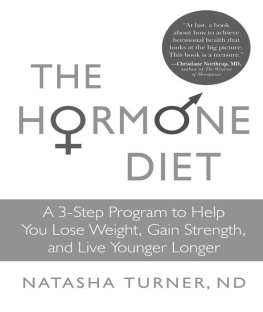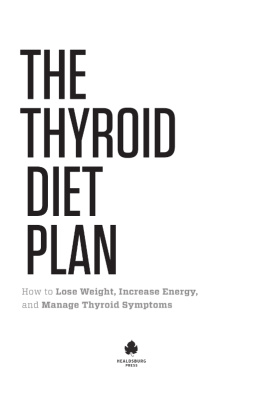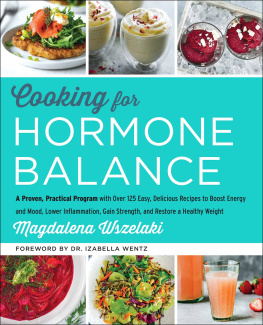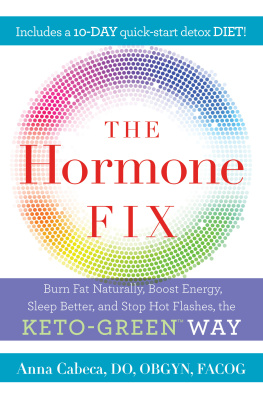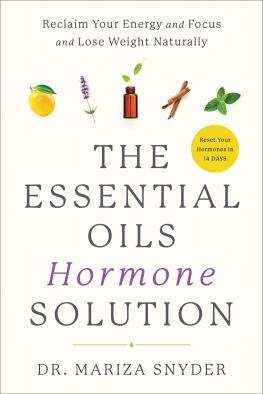


For my husband,
Hey Tim, thank you for believing in me.
I am so blessed to share my life with you.
For Mom,
Thank you for your continued reminders to keep things simple,
be positive, make time for others, live life to the fullest, and
to never take it or your loved ones for granted.
Your courage, strength, wisdom, and humor
inspire mealways. I love you.
CONTENTS
INTRODUCTION
If you are looking for a big opportunity, seek out a big problem.
H. JACKSON BROWN JR.
My Story of Hormonal Havoc
Just a few months had passed since I had graduated from college in 1993. I was 22. I arrived home one day from my summer job in tears and feeling overwhelmed. I felt weak and feverish. I couldnt thinkmy head was buzzing with confusion. I couldnt understand people when they spoke to me. I couldnt seem to process information fast enough to make sense of anything. My best friend, Lise, who was living with me at the time, was talking to me about some mundane household incident and all I could do was stare blankly back at her. She said, Dont worry, I can tell youre just not getting it. Its okay. I started to cry again. I thought I was going crazy and was certain I had a serious neurological disease.
Later that day, I wound up in the emergency room, where the doctors found I indeed had a fever, along with severe anemia. They told me to take some iron and to go home and rest, which was about all I was capable of doing. I would wake up feeling okay, but within minutes the confusion and fogginess in my head would return. I couldnt even watch TV.
When I thought about it as best I could, I realized something had been off for months before my breaking point. I had needed so much sleepover 16 hours a dayand was too tired to go to the gym, even though I was an exercise fanatic. I was gaining weight25 pounds, a lot for my small frameand I felt fat and unattractive. My periods were irregular and I was losing fistfuls of hair. I had chalked it all up to the stress of finishing school and ending a relationship with my boyfriend at the time.
Thank heavens the emergency room doctor who treated me decided to investigate more thoroughly into why I was so anemic and tested my blood to rule out hypothyroidism. Days later, I received a call letting me know my TSH was over 25; a normal level is considered to be less than 4.7, and an optimal level is less than 2. (TSH is a hormone that increases when the thyroid is not functioning well.) I was severely hypothyroid, with extremely low iron levels. Confusion was overcoming me because my brain function was slowing down along with the rest of me. I started taking thyroid medication immediately. Within a week I felt like a completely different person, and I continue to take thyroid medication today.
Looking back, I know I had the telltale symptoms of hypothyroidism as early as age 13. I remember waking up with my pillow covered in my hair and being taken to dermatologists for hair loss, but nothing those doctors proposed ever helped. I remember feeling tired all the time and having horrible menstrual issues, including pain, cramping, and irregular cycles. I always had belly fat and would never wear a two-piece bathing suit. I hated my body.
Now I know my disease was missed because I seemed to be slim. Because my weight appeared normal, my doctors did not think of looking for hypothyroidism, a condition commonly found in noticeably overweight people.
Fast forward to 2000. After finishing 4 years of training, I began my practice as a naturopathic doctor. Between patients, I was skipping out to buy cookies or muffins because I craved them so badly. I never used to like these foods, though I sure had to have them now. But within about 20 minutes of the last sugary bite, I would be falling asleep in a carb coma. Still, I couldnt stop my seemingly insatiable snack habit. At the same time, my periods were becoming more irregular, my breasts were shrinking, my waist was getting wider, and I was losing hairagain.
On a professional hunch, I underwent a thorough investigation involving blood work and ultrasounds. My suspicions were confirmedI had polycystic ovarian syndrome (PCOS). PCOS is a condition characterized by irregular periods, hair loss, acne, and weight gain; its also linked to an increased risk of breast cancer, infertility, and diabetes. So I now had not one, but two metabolic diseases. My family doctor, Dr. Tammy Hermant, suggested the diabetes medication metformin, along with the birth control pill, in an attempt to regulate my periods.
Since PCOS is associated with insulin resistance, the underlying cause of type 2 diabetes, insulin sensitizing medications such as metformin are regularly prescribed to treat it. And I was definitely insulin resistant. Besides the high insulin levels detected by my blood work, my cravings, constant hunger, fatigue after eating, and fat gain around my abdomen were obvious signs. But I was truly not interested in taking the metformin. I also had high levels of testosterone and dehydroepiandrosterone (DHEA), which explained my hair loss, dwindling breasts, and bulking waistline. I was also not interested in taking the birth control pill. Given my training, I wanted to figure out how to manage my healththreatened as it wasin a more safe and natural way.
The Genesis of the Hormone Diet Approach
I had already begun to research hormones and hormonally related conditions. I was fascinated by their interconnectedness and the number of bodily functions they influenced. The standard treatment for a seemingly uncomplicated hormonal issue such as hypothyroidismsimply replacing thyroid hormonewas by no means the complete solution. In fact, it was frighteningly inadequate in many cases.
Today, when I see cases of hypothyroidism in my clinical practice at Clear Medicine, I rarely rush to treat the thyroid deficiency right away. (I make exceptions, of course, when a patients TSH reading is sky-high or the patient already is taking a strong dose of thyroid medication and is still experiencing symptoms.) Instead I start by working to detoxify the patients liver and digestive system; to balance his or her stress hormone levels with good sleep and stress management; to use foods that level out blood sugar and insulin; to replenish the nutrients needed to make thyroid hormone; and to treat PMS or any other signs of sex hormone imbalance. If the patient is still experiencing unresolved symptoms, only then do I address the thyroid.
I believe this approach provides a lasting health fix because each one of these factors influences the thyroid. Jumping right into treating the thyroid would be like building a house on sand. The foundation would constantly be shifting and would require constant repair. Helping a person achieve overall hormonal balance makes specific treatment for the thyroid unnecessary in some cases. While in other cases, body imbalances commonly associated with hypothyroidism, such as low stomach acid (which can reduce nutrient absorption), iron deficiency, high cholesterol, and adrenal (stress) gland fatigue, must be addressed as well.
My multifaceted approach to thyroid treatment has helped me garner a listing as a Top Thyroid Doctor on www.thyroid-info.com. But my approach to hormonal balance goes far beyond treating thyroid patients.
Next page
